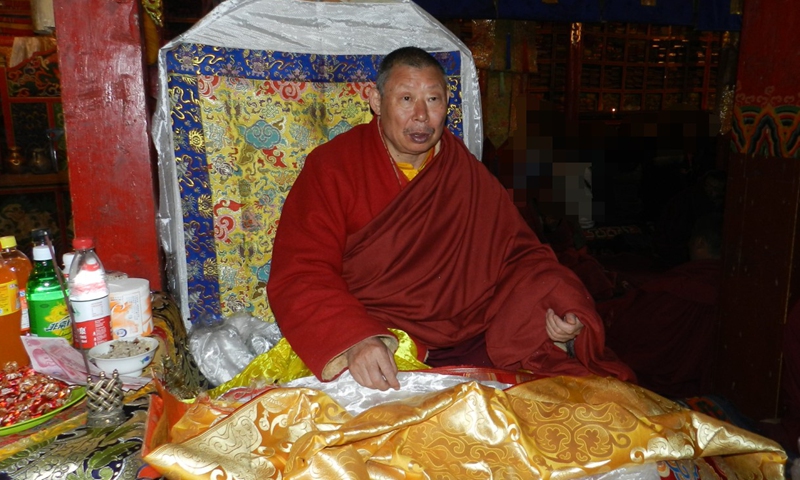
Cash and foreign banknotes are found by the police from Wang's residence. Photo: file picture
A key accomplice
Wang would not have had the opportunity to commit such heinous crimes if it weren't for Lurong, the abbot at Eruo Monastery.
Lurong, through stealing and violating the traditional convention of Tibetan Buddhism, turned Wang, a liar from qigong, into a "living buddha" and helped Wang deceive a huge number of believers in the country.
Lurong has known of Wang's crime as early as 2016, when a woman follower of Wang reported his sexually assaulting women and looting money. But Wang reminded Lurong about how the Eruo Monastery had been depending on Wang's followers' sponsorship.
To not lose Wang as a "money machine," Lurong became Wang's accomplice. He not only published an "investigation report" to prove Wang did not have any problem, but also hired people to remove online posts reporting Wang.
All the punishment Lurong gave Wang was letting him confess in front of the sacred tower and warning him to be a "qualified monk."
"I felt he wanted to use my money to renovate the monastery in order to lift his prestige among locals," Wang said.
From the perspective of Tibetan Buddhism, Lurong's behavior is also a serious violation of Buddhism, said Zhou Wei, an expert on Tibetology. "It completely violated the philosophy of Tibetan Buddhism and the concept of "integrity" in religion. It is all crooked ways."
This is also the reason why the two were prosecuted for "organizing and using a cult to undermine the implementation of the law." Their behavior deviated from Tibetan Buddhism and has long become a "cult."

Wang Xingfu during an illegal "enthronement" in 2008 which seriously violated Tibetan Buddhism rituals. Photo: file picture
Another monster
Apart from Wang's case, police also cracked down a fake living buddha case as appalling as Wang's in Shenzhen of South China's Guangdong Province.
Yang Hongchen, the main suspect in the Shenzhen case, was born in Northeast China and became a monk in a small Hongye Temple in North China's Hebei Province in the late 1990s.
Afterwards, he went to Labrong Monastery in Northwest China's Gansu Province and fabricated a "living buddha" certificate and an ID as a Tibetan. With the new identity, he returned to Hongye Temple and began to deceive people there.
To bamboozle more people, he claimed himself to be the former head of the Chinese Buddhism Association and the reincarnation of respected patriotic monk Sherab Gyatso.
Many victims in Yang's case said that believed Yang's story. But monks in Labrang said Yang was never a monk in the monastery, let alone a living buddha. People from Yang's hometown said Yang wasn't even a monk.
Before 2017, Yang already had dozens of believers. He also raped many of his female followers and caused one to get pregnant.
Under the mind control of Yang, the violated women were either afraid of being cursed by the "living buddha" or believed it was for religious progress. None of the women chose to report Yang's assaults.
Finally, Yang's hedonistic life style drew suspicion from a follower, who reported to the religious administration department in Shenzhen.
The fair trial
In the past three years, the relevant persons involved in the Wang, Lurong and Yang cases have been convicted of serious crimes by the court in the first trial, and completed the second trial this year.
Wang was sentenced to 25 years in prison and fined 20 million yuan for crimes of organizing and utilizing a cult to undermine laws, illegal operation, rape and compulsory indecency. Lurong was sentenced to six years imprisonment and fined 5 million yuan.
Yang was put in jail for 18 years and fined 150,000 yuan for using superstition to undermine law enforcement, fraud, rape and embezzlement. He pleaded not guilty in both court trials and blamed his followers.
Police believe that such scams are still hidden in society, and because some victims are mentally controlled, it greatly increases the difficulty of investigations.
To identify such criminals, Li Hanying, former senior official on religious affairs at the United Front Work Department of the Communist Party of China Central Committee, reminded that the public can check the identity of a "living buddha" at an online query system of the State Administration of Religious Affairs or check with local religious departments.
Li noted that Buddhism is a religion of rationality and wisdom and believers should not blindly obey someone because of admiration. Therefore, everyone must establish this concept of "right faith" and improve the quality of faith and the ability to differentiate between good and evil.
Once a suspicious "living buddha" is discovered, it is even more important to quickly report him to the religious affairs department and public security organs, Li said.
These cases also have triggered thinking of related departments on how to strengthen supervision, stop such frauds in the name of religions, and upgrade publicity on such crimes.
Laxianjia suggested that schools could open some courses on common sense about religions. "It is not to spread religions on campus, but to tell people the essence and knowledge of religions and lead people to have the correct values to avoid being deceived."
Lurong and some Tibetan monks served as accomplices and violated the reputation of Tibetan Buddhism, which experts believe shows Buddhist monks should strictly maintain their reputation and rituals of Tibetan Buddhism and discipline themselves, and therefore safeguard and respect for the freedom of religions in China.






 Reply With Quote
Reply With Quote